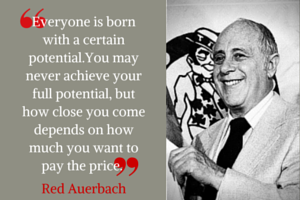Red Auerbach and Helping Players Reach Their Potential
By ASLAN Training
October 24, 2015
3 min read

The ASLAN Other-Centered® Leader
Coaches Quiz Blog Series
Every winner has a coach, and every coach has a philosophy. The ASLAN Other-Centered® Leader Coaches Quiz matches your coaching style with some of the legendary coaches in sports. Here is a deeper look inside the philosophy of one of the best.
Between coaching, being the general manager, and being the president of basketball's Boston Celtics, Red Auerbach influenced several generations of Celtics teams and spawned dozens of NBA coaches and Hall of Fame players. During his career, the Celtics won 16 of 29 championships, a feat unmatched by any other team personnel. During his coaching years, his teams won nine championships in 10 years, including eight in a row from 1957-1966.
The dominant emphasis of Auerbach's coaching style was teamwork. Although his teams excelled on the court, there were not many individual players who made the high scorer lists because they worked so well together as a team that no one player dominated scoring. Auerbach lived out what he taught, eventually resigning as coach so that one of his players could take over.
Auerbach focused on doing what worked best rather than sticking to tradition. He broke the color barrier in 1950 by drafting the first African-American player, and the player-coach who took over for him in 1967 became the first African-American NBA coach. In addition, Auerbach pioneered the fast break as an offensive strategy in basketball.
In 1967, the NBA Coach of the Year Award was renamed the "Red Auerbach Trophy," and Auerbach was inducted into the Basketball Hall of Fame in 1969. Even more important to him than these honors, however, were the 10 Hall of Fame players and six NBA coaches that came from his mentorship during his career.
This excerpt from ASLAN's whitepaper, "Is It Possible That What You Learned About Coaching is Wrong," suggests that mentoring and teamwork only become possible when employees take responsibility for their performance and outcomes.
Who is responsible to improve sales effectiveness - you or your rep? Obviously you are responsible for the overall results of your team - but are you responsible for a rep's willingness to improve? Absolutely not. Here's a critical principle for effective sales coaching. If you grasp this, it will not only shift the primary burden of change to your reps but will ultimately save you countless hours of wasted time spent trying to develop the wrong people: desire determines development.
Change is difficult - it takes work. When a rep doesn't have the desire to do the difficult work required to reach a new level of performance, sales coaching is futile. Desire, not talent or skill, is the only ticket required to enter a coaching session. The responsibility of the sales coach/manager is to be prepared and available - but if the rep is unwilling to put in the effort to improve, what's the point? And that means more than just going through the motions. If that's all that happens, change will never occur.
They Seemed Like They Wanted to Change
But you may be asking, "How do I know if the rep is really willing to change?" This is an important question and highlights a gap in most sales coaching sessions. It's not unlike a common gap we observe in sales conversations between reps and prospects. Think about this . . . why do most reps fail to surface a prospect's true objection or their barrier to moving forward? It's because they never create a clear "fork in the road." They never attempt to gain a commitment that would cause the decision-maker to reveal his or her true intentions. The same is true for a coaching session.
Red Auerbach knew that with the right motivation and passion, a player's potential could be reached. By mentoring players and then getting out of the way, Auerbach created generations of players and coaches that found success in teamwork and responsibility.
Download the entire whitepaper to find out more about mentoring your sales team toward real change and greater success.
Unlock Your Team's Full Sales Potential
Questions? Watch our CEO, Tom Stanfill, address our frequently asked questions below.

